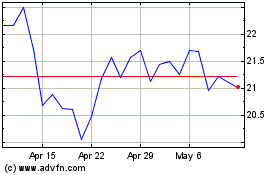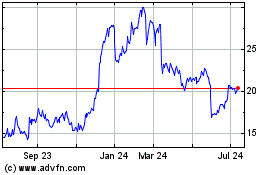SoftBank to List Japanese Telecom To Bolster Finances -- WSJ
February 08 2018 - 3:02AM
Dow Jones News
By Phred Dvorak and Mayumi Negishi
This article is being republished as part of our daily
reproduction of WSJ.com articles that also appeared in the U.S.
print edition of The Wall Street Journal (February 8, 2018).
TOKYO -- SoftBank Group Corp., which already manages the world's
biggest tech-investment fund, is stepping harder on the gas.
The Japanese technology and investment conglomerate said
Wednesday that it is planning to list its cash cow -- the unit that
runs Japan's third-largest mobile carrier -- in part to have even
more money to invest.
"One hundred billion dollars is not nearly enough," said
SoftBank Chief Executive Masayoshi Son, referring to the size of
the company's marquee Vision Fund. "My dreams are too big."
Mr. Son, who announced the plan at an earnings press conference
in Tokyo, said the company would also use the listing proceeds to
strengthen its finances, which have been strained by a series of
huge acquisitions in recent years, including U.S. mobile carrier
Sprint Corp. He said he hoped the Japanese unit, SoftBank Corp.
would go public within a year.
Mr. Son declined to comment on how much money the listing might
raise or how much of that funding SoftBank would use for
investments. Analysts have said the unit's total value could be
about Yen6 trillion to Yen6.6 trillion ($55 billion to $60
billion), meaning a sale of a minority portion under securities
rules could raise nearly $20 billion.
Moody's Investors Service and Standard & Poor's, which both
give SoftBank a non-investment-grade, or "junk," rating, said their
outlooks for the company's credit standing after a listing of the
Japan mobile carrier would depend in large part on how much is
floated. That would determine how much cash flow SoftBank stands to
lose.
Proceeds from a public offering of SoftBank's Japan mobile unit
would bolster an already formidable arsenal of capital, whose
multimillion- and multibillion-dollar investments are roiling the
venture-capital world.
SoftBank last year launched a pair of funds -- the Vision Fund
and an affiliate -- backed by Middle Eastern money and totaling
nearly $98 billion, an amount that far outstrips the size of other
technology-investment funds.
SoftBank and the pair of funds invested some $34 billion in
2017, according to data tracker Dealogic. Recent investments
include about $8 billion in U.S. ride-hailing giant Uber
Technologies Inc., more than $9 billion in Uber's Chinese
equivalent, Didi Chuxing Technology Co., and $300 million in
dog-walking app Wag Labs Inc., which Mr. Son described as "Uber for
dogs."
"This would have been impossible for venture capital up to now,"
said Mr. Son, noting that the amount SoftBank is pouring into
single deals equals the entire capital of many VC funds. "I want to
create a coalition of companies that will continue to grow for 300
years, after I am gone."
As of the end of December, the two SoftBank funds had doled out
about $27.5 billion of their capital and the company was planning
to transfer to them around $10 billion more in investments.
Many SoftBank watchers are already nervous about the size of its
bets and the health of its balance sheet.
Sprint, the U.S. mobile-phone operator controlled by SoftBank,
has only recently returned to profit after years of losses. That
$22 billion purchase by SoftBank in 2013 and the subsequent $32
billion acquisition of U.K. chip designer Arm Holdings PLC sent the
Japanese company's debt soaring and its credit rating tumbling.
Besides debt, SoftBank has relied on its Japanese telecom
operations and its 30% stake in Chinese e-commerce giant Alibaba
Group Holding Ltd. to finance its widening sphere of
acquisitions.
SoftBank formed the Vision Fund last May to help it make
investments without adding to its debt, but the company's total
interest-bearing debt has risen 6% since March, standing at Yen15.8
trillion at the end of December. Its finance costs in the quarter
ended Dec. 31 ballooned to Yen140 billion, up 15% from the previous
year.
Mr. Son said SoftBank is careful with its finances -- a legacy
of its experience after the crash of the internet bubble in the
early 2000s, when the company almost went under.
He said SoftBank has set a ceiling on its debt of 3.5 times
earnings before interest, taxes, depreciation and amortization, a
level that analysts generally view as manageable. SoftBank also
doesn't want debt to exceed 35% of the value of its stockholdings,
including Alibaba, meaning that its debts wouldn't overwhelm it
even if its holdings halved in value. Mr. Son said SoftBank is well
within those limits now.
The company's October-December net profit was Yen912.3 billion,
11 times that of the prior-year period, largely as a result of
benefits to Sprint from the new U.S. corporate-tax law. Its
operating profit fell 3%, missing market expectations.
Write to Phred Dvorak at phred.dvorak@wsj.com and Mayumi Negishi
at mayumi.negishi@wsj.com
(END) Dow Jones Newswires
February 08, 2018 02:47 ET (07:47 GMT)
Copyright (c) 2018 Dow Jones & Company, Inc.
SentinelOne (NYSE:S)
Historical Stock Chart
From Mar 2024 to Apr 2024

SentinelOne (NYSE:S)
Historical Stock Chart
From Apr 2023 to Apr 2024
